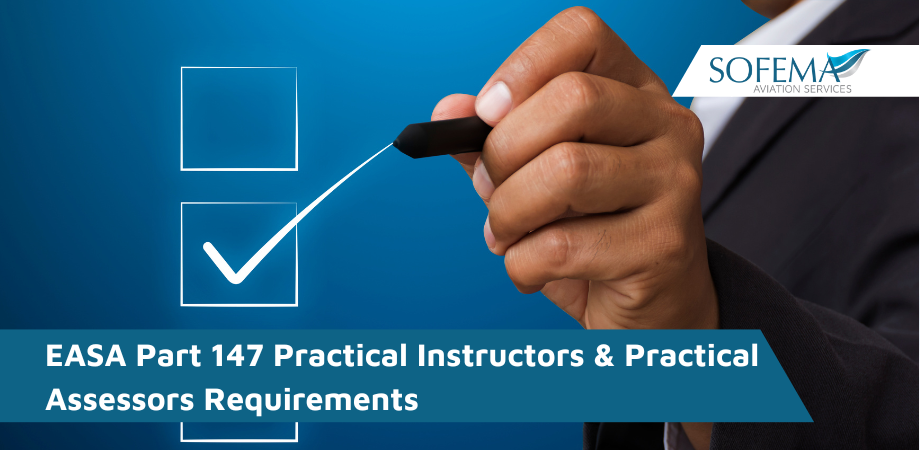Sofema Aviation Services (SAS) www.sassofia.com considers the various requirements related to the acceptance of both EASA Part 147 Practical Instructors & Practical Assessors.
Practical Instructor / Assessor Experience Requirements
He/she has a good command of the subjects included in his/her assigned scope of instruction, examination, or practical assessment. This includes having adequate theoretical knowledge and, where appropriate, hands-on skills gained through practical training and/ or sufficient relevant working experience.
He/she is familiar with instruction, examination, and assessment techniques, as appropriate, and has pedagogical skills & good communication abilities.
He/she is knowledgeable of the organisation’s approved procedures in relation to his/her scope of activity (instruction, knowledge examination, and/ or practical assessments), and he understands the importance of instructional & examination staff ethics & integrity.
He/she is proficient with the specific training methods and equipment used by the particular training organisation.
He/she has sufficient English language proficiency.
Note: The above applies to the instructional staff permanently employed by the Maintenance Training Organisation AND to any sub-contracted or part-time instructor, examiner and assessor (such as independent instructors or contracted MRO’s certifying staff being used as a Practical Instructor & Assessor).
Instructor:
A nominated person who will deliver a Part 66 module (i.a.w. Part 66 appendix I), a Part 66 element (i.a.w. Part 66 appendix III), or part thereof. The instructor is not necessarily the person involved in the drafting of the course material (content, duration and etc.), however, he must be involved at some point in the organization of the lessons themselves (creation of the instructor notes, slides, sequencing and etc.).
Practical Assessor:
A nominated person who will determine the level of practical knowledge/practical skills of the trainees on a particular module, element, or part thereof. The function may include the drafting and/or the selection of practical tasks, the performance oversight, and assessment of the practical activities.
To be deemed as competent, a candidate for the position of instructor, knowledge examiner, or practical assessor. (see also Appendix III to AMC to Part 66)
To be deemed competent, the practical assessors should be:
- Fully knowledgeable in order to build a solid judgment regarding the abilities of the assessed trainees, the assessor should have the required knowledge and experience of the tasks to be assessed.
- He should also be able to determine if the trainee accomplishes the tasks i.a.w. current regulation, utilizing approved procedures, maintenance practices, etc… He should additionally be knowledgeable about the rules and specific procedures (MTOE, etc.) governing the performance of assessments in a controlled environment (Part 147 organisations).
- Trained in assessment techniques. The assessor should be fully aware of the aim of the assessment and conduct a practical assessment in such a way that the true abilities of the candidate are demonstrated.
- These involve technical abilities but also the ability of the candidate to satisfactorily perform the tasks in an actual maintenance environment where basic principles of human factors apply (such as work performed under stressful conditions i.e. time or management pressure etc…).
- Therefore the assessor should remain neutral at all times, and behave in a manner that will not influence or prejudice the final result of the assessment, for example by providing assistance to a stressed candidate.
- Proficient, and in particular the assessor should be familiar with the tools or the techniques used by the training organisation to assess the practical abilities of trainees (maintenance simulators, mock-up and etc.).
Next Steps
Follow this link to our Library to find & Download related documents for Free.
Sofema Aviation Services www.sassofia.com and Sofema Online www.sofemaonline.com provide Classroom, Webinar, and Online training related to regulatory compliance with EASA Part 147 & EASA Part 66. For additional details please visit our websites or email team@sassofia.com
Tags:
aviation, EASA Part 66, EASA requirements, EASA Part 147, practical assessor, SAS blogs, EASA Part 147 Organisation, EASA Part 147 Instructors, EASA Part 147 Practical Instructor, EASA Part 147 Practical Assessor, Maintenance Training Organisation





